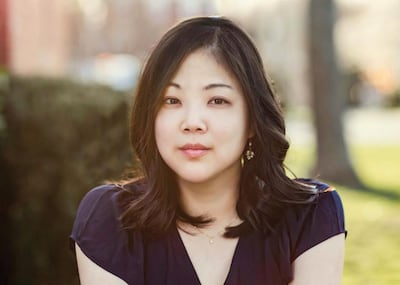Origin stories have a powerful hold over us: they inform where we come from and who we are in the world. They affect our sense of self, and can impact our purpose and direction in life. Ultimately, our stories are part of a continuum that connect us with the generation before us and the one yet to come.
It is the lack of an origin story, the absence of a personal history that Nicole Chung grapples with in her dazzling memoir All You Can Ever Know. Chung, who was adopted as a baby, recounts her experience growing up as with no knowledge about her birth family and only third-hand information as to why they gave her away. "Everything I knew of my life began on the day I was adopted. It was as if I had simply sprung into being as the five-pound, chubby-cheeked two-month-old my parents picked up at the hospital," she writes. Growing up as the only Korean child with white adoptive parents in a small town in Oregon in the United States means she is continuously subject to intrusive questions about her origin and adoption.
She learns to perfect the “family lore” that her parents passed down to her about her adoption, and learns to quash the “tiny, traitorous doubts” that arise from time to time which cause her to question the narrative that has been relayed to her.
Yet she is never fully able to shake off the questions about her life and adoption. “While I did not often question aloud the foundational myth I’d been given, I was always alert for any clues that might fill in the gaps between guesses and facts.” Although there are multiple points when she toys with the idea of getting in touch with her birth family – and at least two occasions where she obtains information – she never quite goes the whole hog, particularly as she knows her adoptive parents don’t want her to search for her birth family. It is only when she becomes pregnant with her first child at the age of 26 that she finds the inner resolve to reach out – partly to access her medical history and partly to provide her own children with the history she never had.
When she does connect with her birth family through the help of an intermediary, they are much more complicated than she could ever have imagined. Not only does she have siblings who do not know of her existence and believe she died at birth, her parents have conflicting stories as to why they gave her away. But as messy and as complicated as her family is – she gains in ways that enrich her life, such as finally accessing “the well-mapped continents on which other people, other families, resided.” Reflecting on reclaiming her past, which stretches back 17 generations and is recorded in 10 volumes of family history, she says: “I wondered if nonadopted people could possibly appreciate what an unimaginable gift it was to possess such a history – the history my birth father apparently took for granted, recorded and preserved through the long generations.”
Although Chung has written extensive personal essays about her adoption and reconnection with her birth family prior to penning her debut novel, it is the searing emotional depths of her writing that carries her narrative. Chung is someone who has done the emotional labour of excavating her feelings and articulating them in a perceptive and incisive way.
For example, she poignantly describes how people who are adopted tend "to turn inward, looking for fault" rather than blaming their birth parents for their decision: "Was it something we did, as babies, as little children? Something we lacked that made us easier, possible, to part with?" She writes movingly about how important it is as an adoptee to believe she "was worthy of memory. That they [her birth parents] still cared. That the adoption was not my fault."
________________________
Read more:
Review: Michael Caine's 'Blowing the Bloody Doors Off' offers lessons in hard lines and lucky breaks
Review: Stephen King's 'Elevation' celebrates a tolerant America
Will '1,000 Books to Read Before You Die' be another must own?
________________________
The idea that she is somehow deficient is first given voice by a boy at her school, who sneeringly tells her that her birth parents gave her away because she was “so ugly”. It is this act of cruelty that leads to “something precious” inside being broken and a belief she can’t trust anyone. It is also around this time, when other children also bully her for being Asian and different, that Chung retreats into the interior world of her imagination and books and writing.
Chung talks of how her desire to find adoption stories that she could relate to, leads to her discovering that there are, in fact, very few that don’t feature a “heartwarming happy ending,” or that aren’t “the kind of adoption story most people wanted to see.” In her memoir, she strives to counterbalance this prevalent narrative and show multiple facets of adoption – what it has given and what it has taken away – by “lay[ing] down the burden of being ‘the good adoptee,’ the grateful little girl who’d been lost and then found.” For the most part, she is successful.


